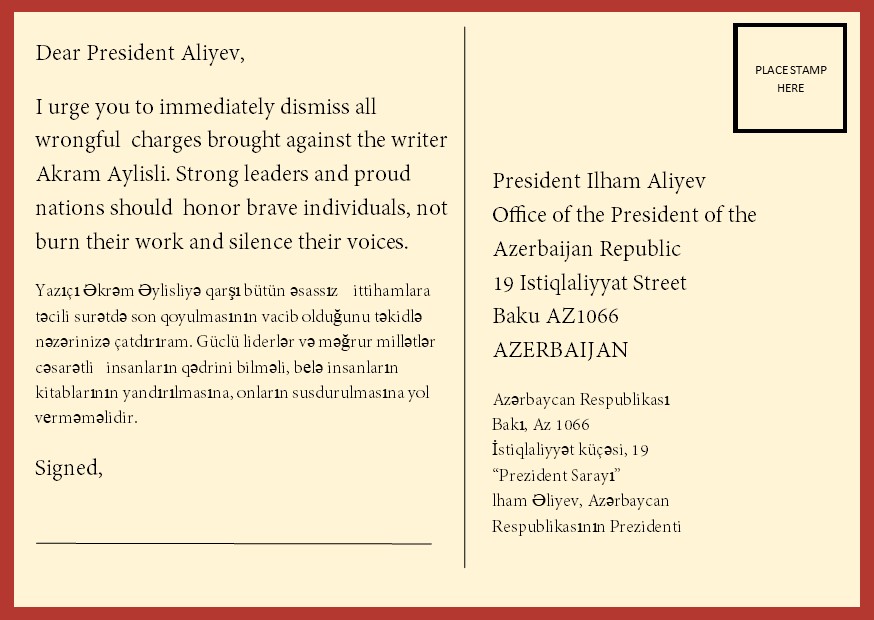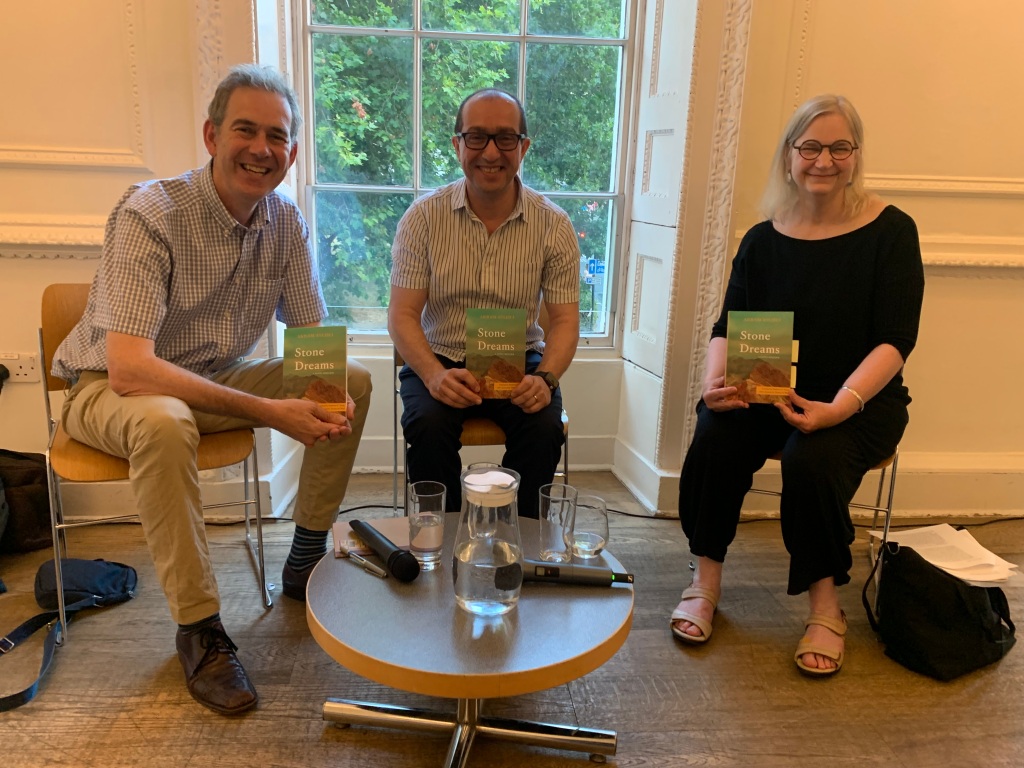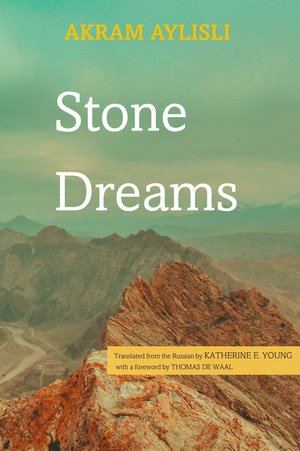In 2017, KATHERINE E. YOUNG was named a National Endowment for the Arts (NEA) Translation Fellow for her project to translate a trilogy of novellas by Azerbaijani political prisoner and Nobel Peace Prize nominee Akram Aylisli. Farewell, Aylis was published by Academic Studies Press in 2018. Akram Aylisli still lives under conditions of de facto house arrest in Baku, Azerbaijan; along with PEN International, Human Rights Watch, PEN America, and many other organizations and individuals throughout the world, Katherine Young continues to advocate for his release and the full restoration of his rights. To add your name to the online petition in support of Akram Aylisli, please visit this link.
Akram Aylisli and Farewell, Aylis
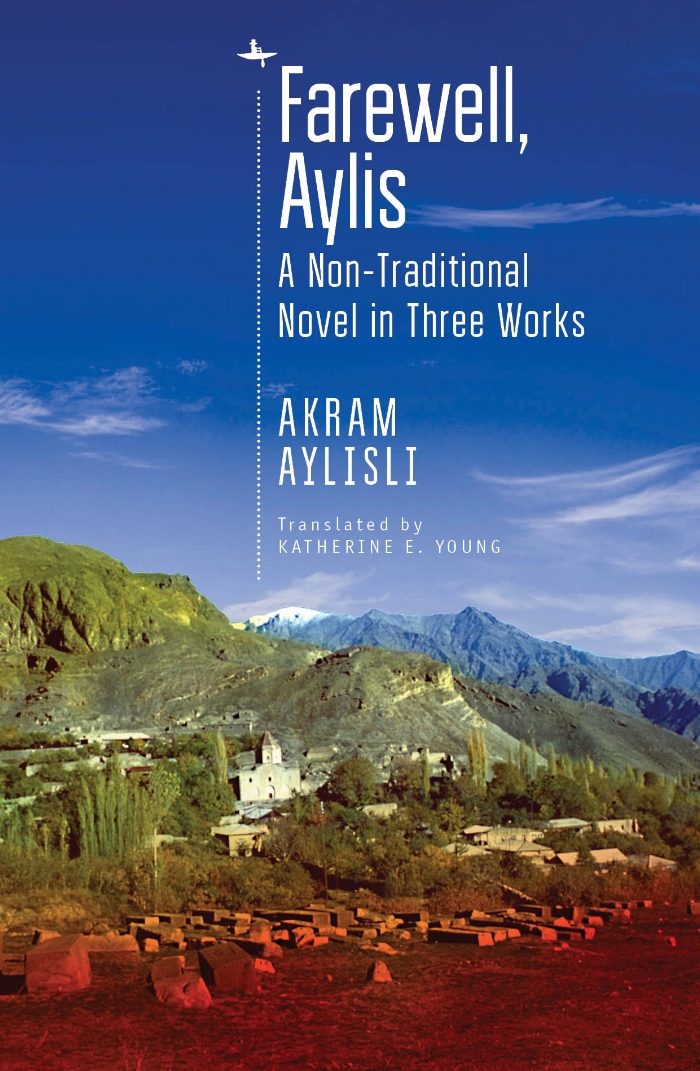
The three novellas of Akram Aylisli’s Farewell, Aylis take place over decades of transition in a country that rather resembles modern-day Azerbaijan. In Yemen, a Soviet traveler takes an afternoon stroll and finds himself suspected of defecting to America. In Stone Dreams, an actor explores the limits of one man’s ability to live a moral life amid conditions of sociopolitical upheaval, ethnic cleansing, and petty professional intrigue. In A Fantastical Traffic Jam, those who serve the aging leader of a corrupt, oil-rich country scheme to stay alive.
Farewell, Aylis also includes a new essay by Akram Aylisli that reflects on the political firestorm surrounding his novellas and his current situation as a de facto prisoner of conscience in Azerbaijan that was commissioned especially for the Academic Studies Press edition.
Katherine Young is available for readings from Farewell, Aylis and speaking engagements about the book. For more information and to schedule an appearance, please contact her directly using this form.
Akram Aylisli’s Story
In 2012 Azerbaijani writer Akram Aylisli (b. 1937) published the second novella of his trilogy Farewell, Aylis in the Russian literary magazine Druzhba narodov. The publication of Stone Dreams (which depicts the real-life pogroms carried out by Azerbaijanis against Armenians as the Soviet Union broke apart, as well as the Armenian genocide in the early 20th century) set off a firestorm in Azerbaijan, where some perceived the work as unpatriotic, or worse. Azerbaijan’s president Ilham Aliyev stripped Aylisli of the title of “People’s Writer” and his presidential pension. Aylisli’s books were burned, his son and wife were fired from their jobs, and he received death threats.


Aylisli’s case has been chronicled by The Washington Post, The Independent, The Guardian, RadioFreeEurope/RadioLiberty, Index on Censorship, and many others and championed by PEN International, Human Rights Watch, PEN America and other international human rights organizations. In 2014 supporters in Russia, the U.K, the U.S., and elsewhere nominated Aylisli for the Nobel Peace Prize (Aylisli Nobel nomination letter). Read PEN America’s January 2019 assessment of Akron Aylisli’s current situation in Azerbaijan and details of the pending legal proceedings against him here. Aylisli currently lives under de facto house arrest in Azerbaijan.
Akram Aylisli’s books being burned in Ganja (photo courtesy of RFE/RL)
PEN International Statement on Harassment of Akram Aylisli
This ludicrous case against Akram Aylisli has been ongoing for nearly three years. His persecution is another stark example of how the Azerbaijani authorities intimidate and harass critical voices. Justice delayed is justice denied. These farcical charges against him must be dropped immediately.
— Carles Torner, Executive Director of PEN International (read more of the December 2018 PEN International statement “Azerbaijan: Harassment of writer must end” here.)
To add your name to the online petition in support of Akram Aylisli, please visit this link.
*New Developments*
Stone Dreams named a “Best Book” of 2023
In December 2023 Kapil Komireddi named Akram Aylisli’s Stone Dreams as one of the “best books” he read in 2023 for The Print.
Katherine E. Young awarded Granum Foundation Translation Prize
In November 2022 Katherine E. Young was awarded the 2022 Granum Foundation Translation Prize for her work-in-progress, translation of Akram Aylisli’s early trilogy of novellas, People and Trees.
Wall Street Journal reviews Stone Dreams
Azerbaijani writer Akram Aylisli has faced similar repercussions for his fidelity to truth and artistic integrity. For years Mr. Aylisli was esteemed in his country with the honorific of “People’s Artist.” Then in 2012 he published, in Russia, the novel “Stone Dreams,” which takes Azerbaijan to task for its part in the pogroms that have accompanied its ongoing territorial war with Armenia. Instantly he was repudiated, his books were burned and his territorial war with Armenia. Instantly he was repudiated, his books were burned and his family was blacklisted. This this day–he is now 84–he lives in Baku under de facto house arrest.
“Stone Dreams,” which has been reissued in Katherine E. Young’s 2018 translation from the Russian, seems an incongruously wistful and elegiac work to incite such condemnation. It centers on a famous Azerbaijani actor, Sadai Sadygly, who has been beaten almost to death after trying to defend an Armenian from mob violence. As he lies in a coma, the scenes waver between the troubled discussions of his doctor and a fellow actor and Sadai’s memories of his childhood in the village of Aylis, near the Armenian border. In his gently idealized reveries, Aylis was once a place of ethnic harmony, marked by the “yellow-rose radiane” of dawn light behind the cupolas of churches that have since been destroyed.
As Thomas de Waal notes in his foreword, because “Stone Dreams” was published in Russian, few of its detractors in Azerbaijan or its champions in Armenia have actually read it, which is why it is treated as a blunt political tract at the expense of its finely shaded literary qualities. Mr. Aylisli touchingly characterizes Sadai as a modern-day Don Quixote, a man who is excessively, even perhaps childishly, sensitive to the plight of the outcast. Melancholy infuses his sunlit remembrances. Far from an exhortation, “Stone Dreams” is a moving, light-fingered tale about the fantasy of empathy, and the dreamers—like Sadai or Mr. Aylisli himself—who sacrifice everything in the effort to give it reality.
Sam Sacks, Wall Street Journal
London book launch for Stone Dreams
On August 15, 2022, the updated translation of Stone Dreams was launched at Pushkin House in London with Thomas de Waal, the BBC’s Famil Ismailov, and translator Katherine E. Young.
August 2022: Academic Studies Press issues updated translation of Stone Dreams with a new foreword by Thomas de Waal
Set during the last years of the Soviet Union, Stone Dreams tells the story of Azerbaijani actor Sadai Sadygly, who lands in a Baku hospital while trying to protect an elderly Armenian man from a gang of young Azerbaijanis. Something of a modern-day Don Quixote, Sadai has long battled the hatred and corruption he observes in contemporary Azerbaijani society. Wandering in and out of consciousness, he revisits his hometown, the ancient village of Aylis, where Christian Armenians and Muslim Azeris once lived peacefully together, and dreams of making a pilgrimage of atonement to Armenia. Stone Dreams is a searing, painful meditation on the ability of art and artists—of individual human beings—to make change in the world.
Akram Aylisli named a finalist for the 2022 Disturbing the Peace Award, Vaclav Havel Library Foundation
The annual Disturbing the Peace award recognizes writers of distinguished works of fiction, literary nonfiction, biography, memoire, drama, or poetry who are courageous in dissent and have suffered unjust persecution for their beliefs. Details here.
PEN International calls for immediate end to harassment of Akram Aylisli
The Azerbaijani authorities must immediately drop trumped-up charges against writer and playwright Akram Aylisli, PEN International said today. Eighty-three-year-old Akram Aylisli has been subject to a years-long campaign of harassment that notably prevents him from leaving the country.
— PEN International statement “Azerbaijan: End harassment campaign against Akram Aylisli,” 30 March 2021 (read full statement here).
Los Angeles Review of Books publishes Akram Aylisli’s remarks
Full text of “Burning Books: Akram Aylisli on Literature and Cultural Memory,” an edited version of Akram Aylisli’s remarks at the December 2020 event sponsored by Columbia University’s Harriman Institute and Institute for the Study of Human Rights and PEN America (see event description and video below), is available here.
Akram Aylisli breaks his public silence
EVENT VIDEO: “Burning Books: Akram Aylisli, Literature, and Human Rights in today’s Azerbaijan.” Akram Aylisli joins scholar Mark Lipovetsky, Azeri-American journalist Alex Raufoglu, and translator Katherine E. Young in his first public appearance in many years to speak about literature, writers who influenced him, his love for the country where his books were burned, and his faith in human empathy. Sponsored by Columbia University’s Harriman Institute and Institute for the Study of Human Rights and PEN America. Event coverage in Corriere della Sera here. Russian-language transcript of Akram Aylisli’s remarks here. English-language transcript of Akram Aylisli’s remarks here.
Press Coverage of Akram Aylisli and Farewell, Aylis
Thomas de Waal updates Akram Aylisli’s story
Indeed, this writer’s life now resembles that of a surreal tale by his favourite authors. At the age of 84, Akram Aylisli is an outcast. He cannot leave Baku, the capital of Azerbaijan, or visit his native village. He is isolated from old friends, family members and readers. His books have been burned and pulled from Azerbaijan’s libraries, theatres and schools. Mostly what remains, he says, is the life of the mind.
Thomas de Waal, “The outspoken Azerbaijani writer exiled in his own country” (read full article here)
The Authors Guild supports Akram Aylisli during Banned Books Week 2020
Full text of “Every Week is Banned Books Week in Azerbaijan” can be found here.
Counterspeak podcast tells the story of Farewell, Aylis
The American Booksellers Association and the American Booksellers for Free Expression devoted their March 2019 Counterspeak podcast to Akram Aylisli’s story. Listen to the podcast here:
PEN America advocates for Akram Aylisli at the Embassy of Azerbaijan
Six years after Akram Aylisli’s books were burned in Azerbaijan, PEN America and translator Katherine E. Young visited the Embassy of Azerbaijan in Washington, DC, to mark the anniversary, demand an end to Aylisli’s persecution, and demonstrate, in Bulgakov’s words, that manuscripts don’t burn.
Farewell, Aylis launched in Washington, DC
PEN America and Politics and Prose bookstore cosponsored a conversation between Akram Aylisli’s American translator, Katherine E. Young, and former U.S. Ambassador to Azerbaijan Richard Kauzlarich to mark the publication of Farewell, Aylis. Video of the January 2019 event can be found here and press coverage here. Akram Aylisli’s response to the book launch can be found here.
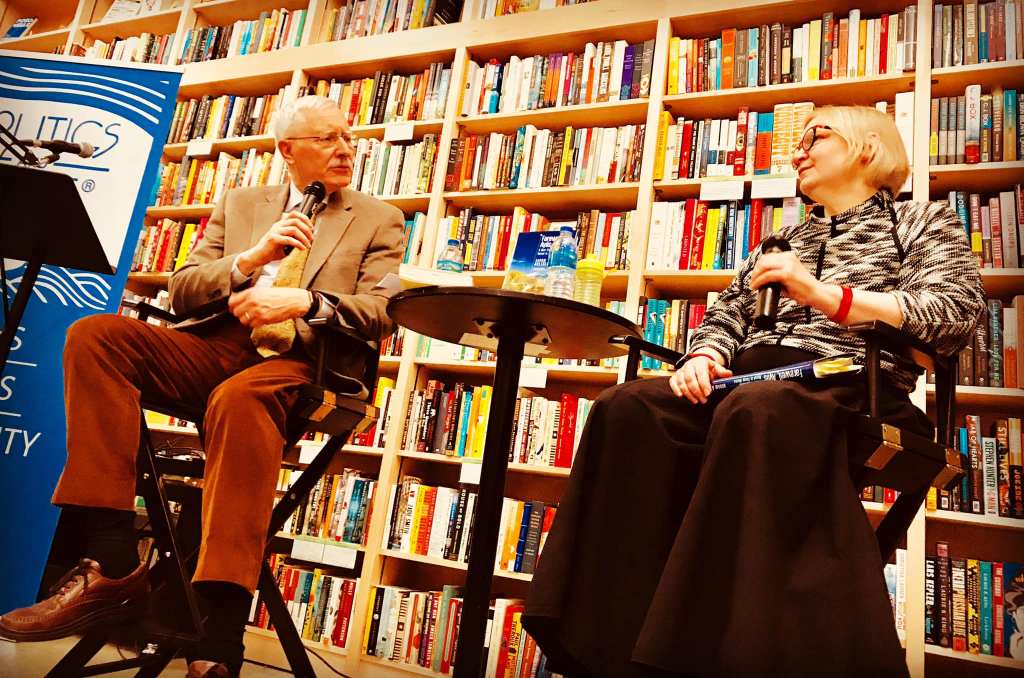
What the press is saying about Farewell, Aylis:
‘If the book finds an audience, finds its readers, in some way carries a resonance in some countries, then that is my power, immortality,’ [Aylisli] said. The authorities who have caused him so much trouble, he added, ‘know well that to physically destroy me is very easy, but morally they are powerless.’
Joshua Kucera, “With English translation, controversial Azerbaijani novel to reach global audience,” Eurasianet.org (read full article here).
Aylisli provokes such anger among his compatriots because of his treatment of the conflict between Armenians and Azeris, which erupted during the collapse of the Soviet Union, first with killings and pogroms, and then as a full-scale war over the mountainous region of Nagorno-Karabakh. Sporadic fighting continues to this day, and years of relentless propaganda has entrenched a culture of hate in both countries. More than any other writer in the region, Aylisli does not shy away from describing the brutal violence, political failure, and moral bankruptcy of his own side.
Howard Amos, “Akram Aylisli: how one Azerbaijani writer dealt with a book burning campaign against him,” The Calvert Journal (read full article here).
[Farewell, Aylis] introduces American audiences to a singular voice of conscience and raises awareness of the challenges Azerbaijan has faced in establishing itself as an independent nation over the last thirty years.
A. Raufoglu, “Akram Aylisli’s book presented in Washington,” Astna.biz, Turan Information Agency (read full article here).
[N]ot once have I regretted the three years spent translating [these novellas] and advocating for their author. And while it is unquestionably a rare and unique honor to work with an author who has literally put his art and his life on the line to call for tolerance, empathy, and understanding, what keeps me going is the beauty of the work, the humanity of the characters, and the joy of discovery on each and every reading.
Katherine E. Young, “Akram Aylisli’s Literary Odyssey,” Words Without Borders (read full article here).
Reviews and Accolades for Farewell, Aylis
World Literature Today lists Farewell, Aylis among its Top 5 Reads from the Spring 2019 issue
See “What to Read Now: Contemporary Russian-language Literature” and the other Top 5 Reads from the Spring issue here.
Words Without Borders names Farewell, Aylis one of eleven “groundbreaking works” from 2018
Find links to all eleven of Words Without Borders’ 2018 “groundbreaking works” here.
We can only benefit from attuning increasingly to narratives that, by aspects of scope, design, and mastery, attempt some step of reconciliation as we continue to work toward more open and peaceful relations among cultures and nations. If a novelist caught between hostile cultural narratives can manage such reconciliation in his own work, it may bode well for many others…eventually.
Lawrence Halvin, World Literature Today (read full review here).
Working from Russian translations of the original Azeri (two by the author himself), Young has given great attention to Aylisli’s unique style that combines elements of socialist realism, Middle Eastern and Persian tales, and social satire. Each piece is set in a different time and place and is populated by different protagonists, yet a continuity exists across the whole. What unites these four works is their engagement with historic trauma and the way hushed-up violence and wrongdoing are transmitted through generations, destroying not only individual lives but also the character of the village, region, and country that guilty people inhabit.
Olga Zilberbourg, The Common (read full review here).
Set in a region where different languages, cultures, religions, ethnicities, and nationalities are tightly intertwined, and sometimes in horrifying tension, the stories come to life through seamless weavings of various layers of memories, dreams, deliriums, rumors, folktales, and realities… Reading Farewell, Aylis is like sitting by the fire at night with the older men of the village and listening to their stories, which in truth are the oral history of a people and a region, which in truth could turn out to be prophecies of our own lives.
Poupeh Missaghi, Asymptote (read full review here).
Beyond the political fervor, Stone Dreams and the other two novellas collected in this remarkable volume offer tremendous gifts to the reader interested in Soviet and post-Soviet culture. In intricately interwoven stories, the teller shows us the work of desecration that the modern state has enacted on traditional culture.
Olga Zilberbourg, “What to Read Now: Contemporary Russian-language Literature,” World Literature Today (read capsule review here).
Farewell, Aylis holds many gifts for its reader. The novellas are each stylistically unique but have a historical and philosophical sequence that both unfold and dialogue with each other powerfully. The characters are realistic: not ideologues, not angels or rogues. The translation is smooth and rhythmic, and the stories maintain their internal thematic consistency in complex ways that speak to the chemistry between the novel and the translator. A reader doesn’t need to know anything about Azerbaijan in order to contact the world of the novels, because the characters are relatable and they capture what we need to know in their stories.
Ryan K. Strader, Cleaver (read full review here).
Excerpts from Farewell, Aylis
Chapter One: The Curious Death of an Old Coat Check Girl, the Deadly Dangerous Joke of a Famous Artist, and the Party Card-Pistol
The condition of the patient just delivered to the trauma department of one of the major Baku hospitals was very serious.They took the patient, who was lying unconscious on the gurney, along the very middle of the half-lit hospital corridor that stretched the length of the whole floor to the operating room, which was located in the other wing of the building. There were two women in white lab coats and two men, also in lab coats. The surgeon himself walked beside the gurney, a spare, silver-haired man of middling height, distinguished from his colleagues by his reserve, the compelling sternness of his face, and the particular cleanliness of his lab coat.
If there was anything unusual or seemingly incongruous in this ordinary scene of hospital life, it was the tragic humor in the appearance and behavior of the person who’d brought the patient to the clinic. That small, fidgety man of fifty-five to sixty whose small face was not at all in harmony with his enormous, round belly ran around the doctor constantly repeating the same thing over and over….
Excerpt from Akram Aylisli’s Stone Dreams published in Words Without Borders (read more of this excerpt here).
It was the height of winter—the last third of January. That year the winter had been without snow from the very beginning; snow fell all of once and thawed immediately. And all Kellekend waited impatiently for when it would snow again.
If you believe the oral folk tale, close to evening, at the first of his wife’s contractions, our surgeon-barber-toothpuller—in whose ears the first shriek of the long-awaited child of the male sex was already ringing—ran, almost dancing from happiness, to the midwife Raziya, brought her home, and left her with his wife. He himself went into a small room and closed the door behind him so no one would disturb the day’s happy solitude.
He’d prepared everything beforehand. In his cellar stood a three-quart container of mulberry vodka sent him in the fall by the accountant Gulu, nicknamed “Collective Farm” (his nickname doesn’t appear further in our narrative), whose three sons Piri had circumcised at one time that spring. He filled a one-quart container of vodka and placed it on a shelf in the room. He arranged appetizers consisting of mutton kaurma, sheep’s cheese, chashyr, and walnuts. And laying low in anticipation of the birth of his son, he prepared to surrender himself to drink all night long.
Excerpt from Akram Aylisli’s A Fantastical Traffic Jam published in National Translation Month (read more of this excerpt here).
For the first time in my life I understood clearly that my fate stands behind me. It’s mine, only mine, and no power of any kind over it has been given to anyone besides me…. Let some in my motherland think I’m not a writer: so be it. I don’t need honor or glory in a country where they burn books and a killer with an ax is elevated to the rank of hero.
Excerpt from Akram Aylisli’s essay Farewell, Aylis published in the Los Angeles Review of Books (read more of this excerpt here).
Advance Praise for Farewell, Aylis
Akram Aylisli has written of the tumultuous times in Azerbaijan on the eve of the Soviet Union’s collapse and in the immediate aftermath. Having lived through some of the chaos, corruption, ethnic strife, and regime change in Azerbaijan in the early 1990s, I can attest to the vividness and veracity of his storytelling. The next best thing to having been there yourself is to read this book.
Richard Miles, former U.S. Ambassador to Azerbaijan, 1992–1993
In the fall of 2011, Akram Aylisli, Azerbaijan’s most important writer, turned in a manuscript that he’d been afraid to publish for six years – this book [Stone Dreams]…. The book had the effect of a bomb exploding. Aylisli was the first Turkic-language writer to write a novel about the Armenian genocide that was deep, personal, and full of suffering. The book allowed thousands of Azeris and Armenians to see one another sympathetically, without hatred. And a huge number of people on both sides are grateful to Aylisli for that.
Shura Burtin, Russian journalist
In countries like Azerbaijan, speaking out against those in power or against the majority view is not just an act of bravery, it becomes an act of great personal risk. Akram Aylisli’s ‘non-traditional’ novel explores what connects us across countries and across religions to ask not just what it means to be human but also what it means to be humane—and is a timely reminder for those in supposedly democratic countries of the way in which the powerful use the language of nationalism and populism to demonize minorities. His evocations of the beauty of his homeland are set powerfully against the horrors committed on that land, making his writing both love sonnet and eulogy—the kind of love that Aylisi himself describes as a ‘clear mirror.’ The world needs writers like Aylisli who are willing to take the risk to hold up such a mirror.
Jodie Ginsberg, CEO of Index on Censorship
Aylisli once again reminds us that human blood can only be cleansed with words and the banality of human history can only be cured through the long-brewed grace of great literature. Aylisli tries to bring the stories of cruelty to make one single human story where every one of us can see her- or himself.
Ece Temelkuran, journalist and author of The Time of Mute Swans: a Novel
Reading Stone Dreams, I was lost between the world of Aylis and the world of Baku in which Sadai Sadygly exists in those final days of his life. Beaten up by a mob for trying to save an elderly Armenian, Sadai re-lives the part of his life when Azerbaijanis and Armenians lived together and regarded one another as fellow humans worthy of respect. For writing about this so honestly, Akram Aylisli and his family members have been persecuted by a regime that today shows no respect even for its own citizens and foments hatred against Armenians.
Richard Kauzlarich, former U.S. Ambassador to Azerbaijan, 1994–1997

